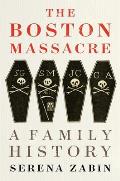Zabin via the Gilder Lehrman Institute, 3 Jan.
On Sunday, 3 January, the Gilder Lehrman Institute will host Serena Zabin discussing and answering questions about the Boston Massacre in its online Book Breaks series.
Zabin, who hails from Lexington and is now a professor at Carleton College, will speak about her book The Boston Massacre: A Family History. This 2020 study focuses on the personal connections that British soldiers and their families forged with the locals whom they rented rooms from, worked for, and had other common interactions with—including sex and marriage.
As the book’s catalogue copy says, “When soldiers shot unarmed citizens in the street, it was these intensely human, now broken bonds that fueled what quickly became a bitterly fought American Revolution.”
But not immediately. While Bostonians didn’t forget the people killed and wounded on King Street in 1770, the removal of the regiments from the center of town and the criminal trials at the end of the year appear to have brought some political peace. The end of most of the Townshend duties, leaving only tea to be taxed under that law, also removed much of the underlying conflict.
In 1771 the Boston Whigs tried to keep up the public unity and fervor against the royal government by producing not one but two Massacre memorial orations, which I’ll discuss as their Sestercentennial anniversaries arrive. But without the thousands of soldiers and their families in the town, ordinary people just didn’t have the same reasons to be upset as they had in previous years.
When army regiments disembarked in Boston again in May 1774, the fear of people dying returned. But even then, there were relationships between soldiers and civilians that in some cases outweighed the political conflict.
This Gilder Lehrman series of discussions is designed to be a resource for history teachers and students. Along with his own questions, host William Roka will ask Zabin some queries submitted by middle- and high-school students in advance of the program.
This session will begin online on Sunday at 2:00 P.M. Eastern time. Register through this page.
Upcoming Gilder Lehrman Book Breaks will feature Marcus P. Nevius on City of Refuge: Slavery and Petit Marronage in the Great Dismal Swamp, 1763–1856 on 10 January and Mary Beth Norton on 1774: The Long Year of Revolution on 31 January.
Zabin, who hails from Lexington and is now a professor at Carleton College, will speak about her book The Boston Massacre: A Family History. This 2020 study focuses on the personal connections that British soldiers and their families forged with the locals whom they rented rooms from, worked for, and had other common interactions with—including sex and marriage.
As the book’s catalogue copy says, “When soldiers shot unarmed citizens in the street, it was these intensely human, now broken bonds that fueled what quickly became a bitterly fought American Revolution.”
But not immediately. While Bostonians didn’t forget the people killed and wounded on King Street in 1770, the removal of the regiments from the center of town and the criminal trials at the end of the year appear to have brought some political peace. The end of most of the Townshend duties, leaving only tea to be taxed under that law, also removed much of the underlying conflict.
In 1771 the Boston Whigs tried to keep up the public unity and fervor against the royal government by producing not one but two Massacre memorial orations, which I’ll discuss as their Sestercentennial anniversaries arrive. But without the thousands of soldiers and their families in the town, ordinary people just didn’t have the same reasons to be upset as they had in previous years.
When army regiments disembarked in Boston again in May 1774, the fear of people dying returned. But even then, there were relationships between soldiers and civilians that in some cases outweighed the political conflict.
This Gilder Lehrman series of discussions is designed to be a resource for history teachers and students. Along with his own questions, host William Roka will ask Zabin some queries submitted by middle- and high-school students in advance of the program.
This session will begin online on Sunday at 2:00 P.M. Eastern time. Register through this page.
Upcoming Gilder Lehrman Book Breaks will feature Marcus P. Nevius on City of Refuge: Slavery and Petit Marronage in the Great Dismal Swamp, 1763–1856 on 10 January and Mary Beth Norton on 1774: The Long Year of Revolution on 31 January.


1 comment:
Thanks, John! I’ll look forward to your discussions of those fabulous orations!
Post a Comment